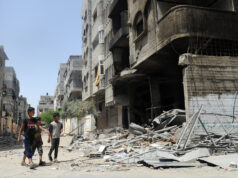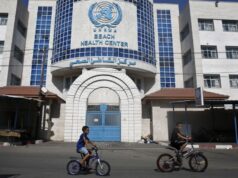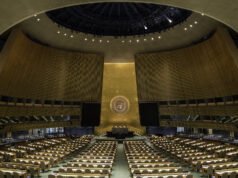The UN Security Council voted Thursday evening to impose a no-fly zone and permit the use of “all necessary measures,” including military force, to protect civilians in Libya from leader Muammar Qaddafi’s brutal crack-down against rebel factions. The resolution, which demands the “immediate establishment of a cease-fire and a complete end to violence and all attacks, and abuses, of civilians,” was approved with ten votes, with China, Russia, Germany, India, and Brazil choosing to abstain.
But before the world powers were forced to make good on their word, Libya complied with the resolution, declaring a cease-fire Friday morning. “We decided on an immediate ceasefire and on an immediate stop to all military operations,” Libyan Foreign Minister Moussa Koussa told reporters. And yet, according to unconfirmed reports, in Misrata, the last rebel-held western city, a pro-government assault is persisting and casualties are mounting. The rebel forces, who don’t trust Qaddafi, told reporters his cease-fire declaration is a trick to buy time.
 It is uncertain how Qaddafi’s cease-fire will affect the UN-sanctioned intervention. Secretary of State Hillary Clinton said Friday that the Qaddafi regime will have to back its declaration with action. “We are going to be not responsive or impressed by words, we have to see actions on the ground and that is not yet at all clear,” Clinton said, clarifying that the ultimate goal remains getting rid of Qaddafi. It should be recalled that Saddam Hussein made a decade-long art form of eluding UN resolutions and sanctions.
It is uncertain how Qaddafi’s cease-fire will affect the UN-sanctioned intervention. Secretary of State Hillary Clinton said Friday that the Qaddafi regime will have to back its declaration with action. “We are going to be not responsive or impressed by words, we have to see actions on the ground and that is not yet at all clear,” Clinton said, clarifying that the ultimate goal remains getting rid of Qaddafi. It should be recalled that Saddam Hussein made a decade-long art form of eluding UN resolutions and sanctions.
At this point, however, much of the world is left wondering if international action has come too late to oust Qaddafi. For weeks, while the U.S. threatened to use action but refrained from doing so, Qaddafi has been pushing back the rebel forces, eliminating their strongholds one by one. Moreover, while action today will certainly save Libyan lives, the latest report estimates that at least 6,000 people were killed during the first two weeks of fighting; the fighting has been ongoing now for four weeks.
As secretary of state under President Reagan, George Shultz, once said of Qaddafi: “If you let people get away with murder, you’ll get murder.” Indeed.





